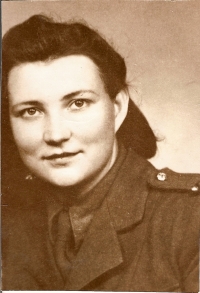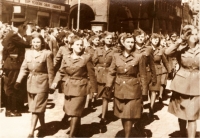To fight until the last breath

Stáhnout obrázek
Alla Boroličová, née. Karfíková was born on the 29th of November in 1922 in Zdolbuniv in Volhynia, then in Poland, nowadays a part of Ukraine. Her father died in a tragic accident in the cement plant where he worked and this landed the family in a difficult situation. Alla had to earn money so that she could pursue her studies by working in the fields or by tutoring younger students. At the autumn of 1942, she was held and interrogated in the local Gestapo headquarters for four weeks. In 1944, she joined the First Czechoslovak Army. She trained as a nurse in the Kyiv hospital and then she was … to the front near the Dukla Pass. She worked in a field hospital which moved towards the West behind the front across Slovakia. At the end of the war, she was stationed near Kutná Hora. After the war, she worked in the army hospital in Slané and then in Hradec Králové where she worked in procuring material from the former German field hospitals. From 1947 on, she worked in a repatriation centre in Žatec, one year later, she relocated to the army hospital in Terezín where she stayed until 1951 when she was discharged. Thanking to her knowledge of Russian, she got a job in the office for distance geological survey in uranium mines in Horní Slavkov. Here, she got married for the second time and with her husband, Michal Borolič, they were transferred to the newly established uranium mines in Dolní Rožínka in the Vysočina region. Here she returned to the job she was actually trained for and became a healthcare worker. After her husband‘s death, she moved to Žatec where she lived at the time of recording in 2005


![Volhynian graduates of the nursing course in Kyiv, August - October 1944. Sitting on the ground, from the left: Helena Průšová-Prokešová, Stanislava Zolerová-Havlíčková, Alla Karfiková-Boroličová, unknown. Source: Československé ženy [Czechoslovak Women]](https://www.pametnaroda.cz/sites/default/files/styles/witness_gallery/public/2020-04/119.jpg?itok=3VOlgBhx)